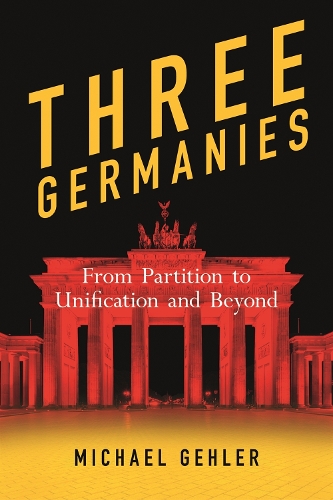
Three Germanies: From Partition to Unification and Beyond, Second Expanded Edition
(, 2nd edition)
Publishing Details
Three Germanies: From Partition to Unification and Beyond, Second Expanded Edition
By (Author) Michael Gehler
Reaktion Books
Reaktion Books
15th April 2021
2nd edition
United Kingdom
Classifications
General
Non Fiction
943.087
Physical Properties
392
Width 156mm, Height 234mm
Description
An ambitious, valuable history of a major European power
Following the defeat of the Third Reich in 1945, Germany has experienced recurring turmoil and reinvention. In this ambitious book, Michael Gehler explores the political path Germany has taken since the Yalta Conference, observing the different Germanies against the background of the Cold War, European integration, and international relations.
Written from an independent perspective, it provides a valuable assessment of our own times, as he shows how the three Germanies (Bonn, Pankow, and today's 'Berlin Republic') sought to establish governments that could create stable states.
'A really superb overview of post-war German politics and political culture.'- European Review of History
'Michael Gehler's Three Germanies tells the stories of East and West Germany in parallel...His description of how the two republics contributed to the division of Germany during the fluid early phase of the cold war...is especially perceptive.'-New Statesman
Reviews
The strength of Michael Gehlers Three Germanies is that it tells the stories of East and West Germany in parallel . . . His description of how the two republics contributed to the division of Germany during the fluid early phase of the cold war that ended with the erection of the Berlin Wall in 1961 is especially perceptive. * New Statesman *
The amount of political and economic information provided is prodigious . . . The studys extensive data will serve as a valuable reference source . . . Gehler makes many valuable observations, and his summary chapter is an excellent overview of his detailed presentation . . . this volume should not be overlooked. Recommended. * Choice *
This is a really superb overview of post-war German politics and political culture . . . Gehler has brought together an impressive array of live historical debates about both the German Democratic Republic and the Federal Republic of Germany, as well as their successor state. Whilst historians with a current expertise are still likely to find stimulation, the book is invaluable to students as an introduction to German politics after 1945 . . . Three Germanies provides what might be described as a straight political history, but comes into its own when placing political change within its social and cultural context. * European Review of History *
Author Bio
Michael Gehler is Director of the Institute of History at the University of Hildesheim and Jean Monnet Chair of Comparative European Contemporary History and Europes integration.
